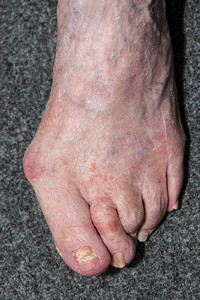
(908) 381-8160Berkeley Heights
 Regardless of the season, bunions and the pain associated with them plague athletes of all fields. Skiers, hockey players, basketball players, and other athletes involved in running sports are all susceptible to developing the condition. A bunion is characterized as a painful swelling of soft tissue and bone enlargement over the inner side of the ball of the big toe joint. With progression, the condition can become arthritic and may be accompanied by pain and the inability to wear shoes and walk comfortably. Treatment for bunions depends on the severity of the condition. In many cases, orthotics and wider fitting shoes can help, whereas more severe cases may call for surgery.
Regardless of the season, bunions and the pain associated with them plague athletes of all fields. Skiers, hockey players, basketball players, and other athletes involved in running sports are all susceptible to developing the condition. A bunion is characterized as a painful swelling of soft tissue and bone enlargement over the inner side of the ball of the big toe joint. With progression, the condition can become arthritic and may be accompanied by pain and the inability to wear shoes and walk comfortably. Treatment for bunions depends on the severity of the condition. In many cases, orthotics and wider fitting shoes can help, whereas more severe cases may call for surgery.
If you are suffering from bunions, contact Dr. Janet Leicht of New Jersey. Our doctor can provide the care you need to keep you pain-free and on your feet.
What Is a Bunion?
A bunion is formed of swollen tissue or an enlargement of boney growth, usually located at the base joint of the toe that connects to the foot. The swelling occurs due to the bones in the big toe shifting inward, which impacts the other toes of the foot. This causes the area around the base of the big toe to become inflamed and painful.
Why Do Bunions Form?
Genetics – Susceptibility to bunions are often hereditary
Stress on the feet – Poorly fitted and uncomfortable footwear that places stress on feet, such as heels, can worsen existing bunions
How Are Bunions Diagnosed?
Doctors often perform two tests – blood tests and x-rays – when trying to diagnose bunions, especially in the early stages of development. Blood tests help determine if the foot pain is being caused by something else, such as arthritis, while x-rays provide a clear picture of your bone structure to your doctor.
How Are Bunions Treated?
If you have any questions, please feel free to contact our office located in Berkeley Heights, NJ . We offer the newest diagnostic and treatment technologies for all your foot care needs.